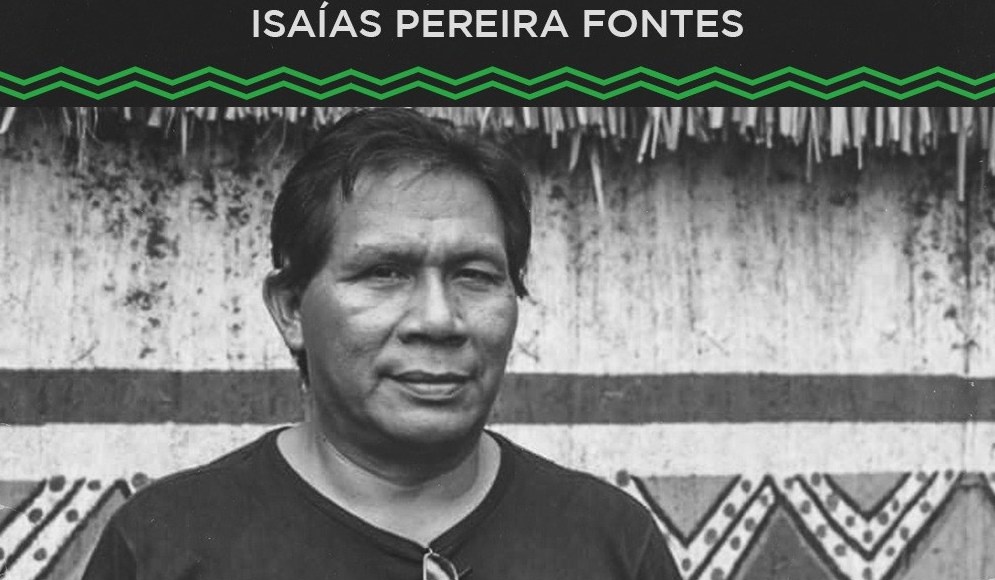Covid 19 will affect Brazil’s indigenous groups for many years, not only because of the number of lives it has taken but also because among those dead are many important indigenous leaders. With indigenous groups under an unprecedented onslaught from the country’s government, headed by President Jair Bolsonaro, the knowledge and courage of these leaders will be sorely missed. Here LAB briefly profiles one important leader who was lost to the disease.
Isaías Pereira Fontes, or Komadeeroa to use his Baniwa name, an indigenous leader from Brazil’s Rio Negro area, passed away on Monday 1 February in a hospital in Manaus, while awaiting treatment for Covid-19. Fontes dedicated his life to the indigenous movement in Rio Negro, and, at the time of his death, was a director of FOIRN (Federation of Indigenous Organisations of the Rio Negro), representing the Baniwa and Koripako people. He fell ill on the week of his 53rd birthday and was soon transferred to a hospital in São Gabriel da Cachoeira, on the Colombia-Venezuela border.
Located 852 km from the state capital, Manaus, São Gabriel da Cachoeira is ill-equipped to deal with extreme cases of Covid. “São Gabriel does not have a single Intensive Care Unit (ICU), and when patients get very seriously ill, they have to be taken to Manaus,” says Carla Dias, an anthropologist with the leading Brazilian NGO, Instituto Socio-Ambiental (ISA).
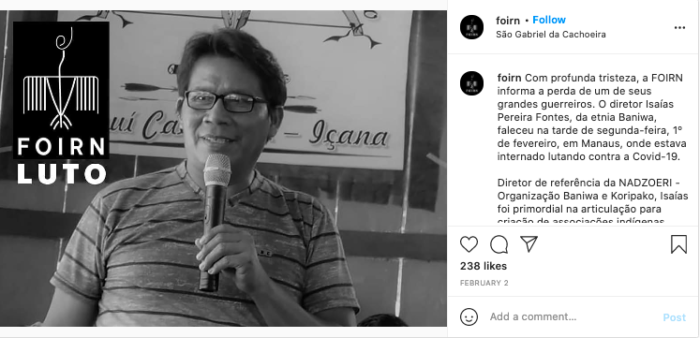
Showing no signs of improvement, Isaías Fontes was finally transferred to Manaus on the 27th January. But the Manaus health system itself is in a state of collapse, unable to deal with the influx of severely ill patients. “Health professionals are physically and psychologically exhausted, and patients from Manaus and the interior of Amazonas state are queuing for beds. In a word, we are going through a crisis of unprecedented dimensions. Perhaps we are witnessing one of the most painful situations in the history of this pandemic”, said Jesem Orellana, from the Amazonia branch of the Brazilian Health Ministry’s Oswaldo Cruz Foundation (FIOCRUZ), one of Latin America’s leading health institutions.
Isaías Fontes was a victim of this chaos. He died a few days after he reached Manaus, while waiting for treatment in the corridor of a Manaus hospital.
Isaías Pereira Fontes was born into the ‘Hohoodeni’ clan, a line of leaders of the Baniwa people. His community, Ucuqui Cachoeira, is located on a tributary of the Ayarí river, which is itself a tributary of the Rio Negro, around 300km away from São Gabriel da Cachoeira, the closest town.
Upon leaving the community in 1980, he studied first at a Catholic school in São Gabriel and later at the School of Agriculture in Manaus. The completion of his education marked the birth of his dedication to activism; in 1992, he helped found the OIBI (Indigenous Organisation of the Içana River), an organisation of Baniwa and Koripako people, which seeks to to promote sustainable development in communities along the Içana river, another tributary of the Rio Negro, home to many Baniwa and Koripako communities. The Içana river flows through land which has since been designated Alto Rio Negro Indigenous Territory.
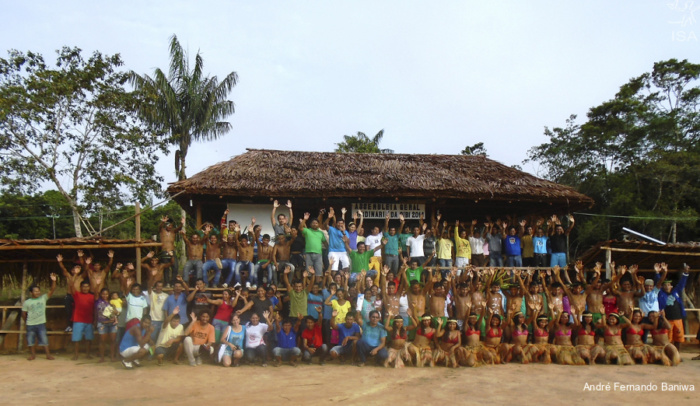
In 1995, he went on to found the Association of Indigenous Communities of the Ayari River. He moved to São Gabriel in 2000, where he became the financial director of the FOIRN and later helped to reorganise the regional branch of FOIRN which represents the Baniwa and Koripako people, forming the ‘Organização Baniwa e Koripako Nadzoeri’. His work was also fundamental in organising UMIRA (Union of Indigenous Women of the Ayari River).
The organisations he founded have been highly influential in the communities they seek to support. The OIBI has organised numerous projects promoting fair trade and education. For example, the initiative ‘Arte Baniwa’ (Baniwa Art) was set up in order to promote the traditional craft of ‘arumã’ basketry and organise it into a commercially viable and sustainable enterprise.
They also established the ‘Kophe Koyaanale’ Project, which aims to develop sustainable fishing practices along the Içana River, by combining the knowledge and traditions of the indigenous communities in the area with more recent scientific ideas. Isaías Fontes helped to set up schools in Baniwa and Koripako communities, as well as to resist the encroachment of mining companies onto indigenous land. Poignantly, as part of the FOIRN, he fought for better healthcare in the communities along the Rio Negro, whose healthcare systems have collapsed under the pressure of the Covid-19 pandemic.
A video from FOIRN explaining the impact of Covid on indigenous communities and asking for help.
Indeed, the pandemic has disproportionately affected indigenous communities in the Amazon. Manaus is the only city in Amazonas State with hospitals equipped with Intensive Care Units. The state is more than three times the size of California, with a population of 4.3 million, and the lack of resources for such a vast area is reflected in the high mortality rate of Indigenous people from Covid-19: studies show that the mortality rate in indigenous communities is 16% higher than the national average.
Earlier this year, the government of Amazonas State released a letter asking for support from the international community as the healthcare system in Manaus threatens to collapse for a second time during the pandemic. The letter states that “the situation is dire, and our fear is that the same situation we are seeing in the capital Manaus will reach the inland of Amazonas, the traditional and indigenous populations that are in a situation of greater vulnerability.”
The publication of this letter demonstrates the failure of Bolsonaro’s administration to deal adequately with the pandemic; the president himself has publicly trivialised the virus and his health minister has focussed less on testing and vaccination, and more on pushing Chloroquine as an ‘early treatment’, despite the lack of evidence for the effectiveness of the anti-malaria drug. Amazonas State recently received an emergency shipment of oxygen from Venezuela, a nation in economic collapse, and from Greenpeace. As of early January, the number of cases among indigenous people in Brazil had reached 44,680, with 915 deaths.
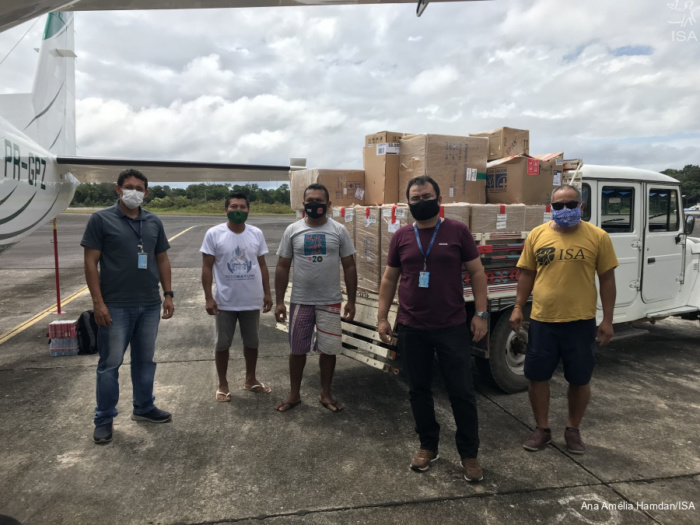
Isaías Fontes’ funeral was held on 3 February, 2021 in the São Gabriel da Cachoeira Municipal Cemetery. Tributes have been pouring in from many of the people and organisations he worked with. André Baniwa, head of the OIBI, gave this tribute to the Instituto Socio-Ambiental:
“Within his clan, Isaías was the head of a line of leaders. For this reason, he was a natural leader, happy, calm, always a peacemaker, always seeking out joy. It is not just me who has lost Isaías. It is not just the Baniwa and the people of the River Ayari who have lost a leader. We have lost a partner who thinks and dreams, a man with a vision of the future. We have all suffered this loss. Isaías fought to prevent deaths, through his work with FOIRN, he helped so many people, Baniwa and others, by bringing them resources, leading, discussing. We will continue his fight.”
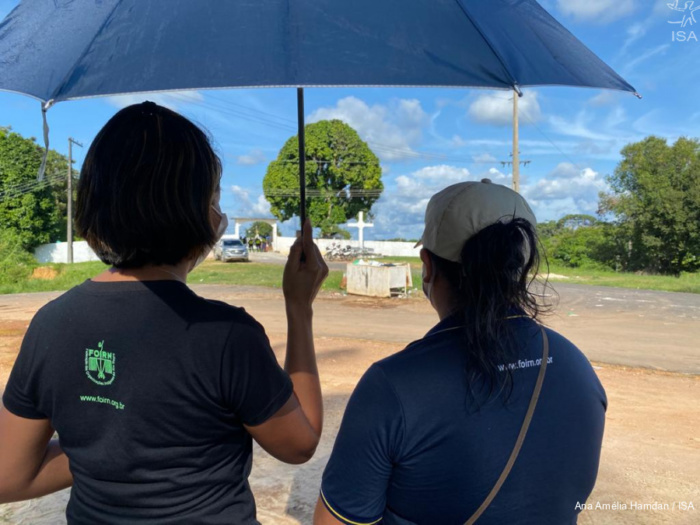
The loss of a leader like Isaías Fontes is a blow to the communities of the Rio Negro at an already challenging time. That an indigenous leader should pass away while waiting for treatment for Covid-19 in a hospital on the verge of collapse, is indicative of the state of emergency in the Amazon region at the moment and the consistent neglect of indigenous communities shown by Bolsonaro’s government.
Main image: APIB – Articulação dos Povos Indígenas do Brasil / Facebook.

